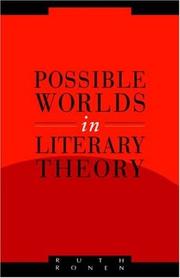| Listing 1 - 2 of 2 |
Sort by
|

ISBN: 0521456487 0521450179 0511597487 Year: 1994 Volume: 7 Publisher: Cambridge New York Cambridge University Press
Abstract | Keywords | Export | Availability | Bookmark
 Loading...
Loading...Choose an application
- Reference Manager
- EndNote
- RefWorks (Direct export to RefWorks)
The concept of possible worlds, originally introduced in philosophical logic, has recently gained interdisciplinary influence; it proves to be a productive tool when borrowed by literary theory to explain the notion of fictional worlds. In this book Ruth Ronen develops a comparative reading of the use of possible worlds in philosophy and in literary theory, and offers an analysis of the way the concept contributes to our understanding of fictionality and the structure and ontology of fictional worlds. Dr Ronen suggests a new set of criteria for the definition of fictionality, making rigorous distinctions between fictional and possible worlds; and through specific studies of domains within fictional worlds - events, objects, time, and point of view - she proposes a radical rethinking of the problem of fictionality in general and fictional narrativity in particular.
Theory of knowledge --- Literature --- Dialectic (Logic) --- Dialectiek (Logica) --- Dialectique (Logique) --- Logic --- Logica --- Logique --- Mogelijkheid --- Mogelijkheid in de literatuur --- Possibility --- Possibility in literature --- Possibilité --- Possibilité dans la littérature --- Realiteit in de literatuur --- Reality in literature --- Réalité dans la littérature --- Werkelijkheid in de literatuur --- 82.0 --- Fiction --- -Possibility in literature --- -Fiction --- Metafiction --- Novellas (Short novels) --- Novels --- Stories --- Novelists --- Argumentation --- Deduction (Logic) --- Deductive logic --- Logic, Deductive --- Intellect --- Philosophy --- Psychology --- Science --- Reasoning --- Thought and thinking --- Literatuurtheorie --- Technique --- History and criticism --- -Theory, etc --- Methodology --- Logic. --- Possibility in literature. --- Possibility. --- Reality in literature. --- Theory, etc. --- Technique. --- -Literatuurtheorie --- 82.0 Literatuurtheorie --- -Argumentation --- Fiction writing --- Writing, Fiction --- Authorship --- History and criticism&delete& --- Theory, etc --- Arts and Humanities

ISBN: 0253350042 9780253350046 Year: 1991 Publisher: Bloomington: Indiana university press,
Abstract | Keywords | Export | Availability | Bookmark
 Loading...
Loading...Choose an application
- Reference Manager
- EndNote
- RefWorks (Direct export to RefWorks)
Linguistics --- Fiction --- Lexicology. Semantics --- Artificial intelligence. Robotics. Simulation. Graphics --- Literary semiotics --- Thematology --- Possibility in literature --- Artificial intelligence --- Narration (Rhetoric) --- Semiotics and literature --- Technique --- 82-3 --- -Narration (Rhetoric) --- Literature and semiotics --- Literature --- Narrative (Rhetoric) --- Narrative writing --- Rhetoric --- Discourse analysis, Narrative --- Narratees (Rhetoric) --- Metafiction --- Novellas (Short novels) --- Novels --- Stories --- Novelists --- AI (Artificial intelligence) --- Artificial thinking --- Electronic brains --- Intellectronics --- Intelligence, Artificial --- Intelligent machines --- Machine intelligence --- Thinking, Artificial --- Bionics --- Cognitive science --- Digital computer simulation --- Electronic data processing --- Logic machines --- Machine theory --- Self-organizing systems --- Simulation methods --- Fifth generation computers --- Neural computers --- Proza. Fictie. Narratologie --- Philosophy --- Artificial intelligence. --- Possibility in literature. --- Semiotics and literature. --- Technique. --- Narration (Rhetoric). --- 82-3 Proza. Fictie. Narratologie --- Fiction writing --- Writing, Fiction --- Authorship --- Narration --- Possibilité --- Intelligence artificielle --- Sémiotique et littérature --- Possibilité --- Sémiotique et littérature
| Listing 1 - 2 of 2 |
Sort by
|

 Search
Search Feedback
Feedback About UniCat
About UniCat  Help
Help News
News